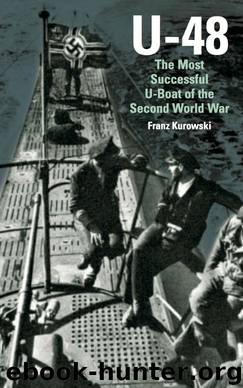U-48: The Most Successful U-Boat of the Second World War by Kurowski Franz

Author:Kurowski, Franz [Kurowski, Franz]
Language: eng
Format: epub
ISBN: 9781783830800
Publisher: Frontline Books
Published: 2011-04-30T00:00:00+00:00
In response to an enquiry to the Torpedo Inspectorate given the highest priority, it was confirmed that U-65 and U-48 had been issued contact pistols with four-bladed propellers. The report read: ‘These pistols have the risk of remaining inactive. They were issued to the boats without adequate testing.’ This was a reply which in wartime in every country in the world would have resulted in an immediate court-martial. Frantic meetings on the subject of torpedoes abounded. Ever more references and instructions were issued to boats at sea. Again and again U-boat commanders attacked and suffered the same disappointment, and were then subjected to the heaviest depth-charge attacks because the intended victim remained afloat and unharmed and went on the offensive itself.
On 19 April 1940, U-3, U-5, U-6 and U-48 ran into their bases one after another. When Herbert Schultze was making his report to Dönitz his feelings got the better of him. He accused those responsible for the debacle of sabotage and demanded their immediate arrest and court martial. He would testify personally as to how often and for how long he had been making reports about torpedo failures. It took some time for Dönitz to pacify him and prevent him losing his head completely. He gave Schultze his solemn assurance that he would personally see that this was done. Prien arrived in U-47 on 26 April and was also furious, describing his attacks and the torpedo failures in minute detail. When he had finished and Dönitz assured him that he would be successful on the next operation, Prien replied: ‘Jawohl, Herr Admiral! But only if we get torpedoes which work, and do not have to fight with wooden swords!’
The list of boats which had attacked large British warships and troop transports was very long. If only half the torpedoes fired had exploded at the target, it would have inflicted a devastating defeat on Britain. The only German U-boat to succeed was U-9 (Lüth) which sank a transport on 20 April. Commanders such as Kretschmer, Prien, Schultze and others had been in dead-certain shooting positions but were denied by torpedo failures. Neither the magnetic pistol not the depth-setting devices worked as designed.
‘The torpedo crisis is a national tragedy,’ Grossadmiral Raeder declared. The question now confronting Dönitz was whether he could continue to send to sea U-boats equipped with dud torpedoes. Every unsuccessful attack through torpedo failure brought the U-boat involved into danger of being sunk itself. In a conversation with Korvettenkapitän Godt, Chief of the Operational Staff, the latter stated to Dönitz that it would be irresponsible to send U-boats to sea armed with such torpedoes. ‘I felt however,’ Dönitz wrote, ‘that at this stage I could not bring the U-boats to a standstill without damaging the arm to an inestimable extent.’5
In the weeks following the debacle, Dönitz visited one flotilla after another and also the Baltic training centres where he spoke to commanders and crews and gave heart to the demoralised men. At the same time the matter was at last before the Reich War Court.
Download
This site does not store any files on its server. We only index and link to content provided by other sites. Please contact the content providers to delete copyright contents if any and email us, we'll remove relevant links or contents immediately.
The Radium Girls by Kate Moore(12018)
100 Deadly Skills by Clint Emerson(4921)
Rise and Kill First by Ronen Bergman(4780)
The Templars by Dan Jones(4682)
The Doomsday Machine by Daniel Ellsberg(4484)
The Rape of Nanking by Iris Chang(4203)
Killing England by Bill O'Reilly(3996)
Stalin by Stephen Kotkin(3957)
Hitler in Los Angeles by Steven J. Ross(3942)
12 Strong by Doug Stanton(3541)
Hitler's Monsters by Eric Kurlander(3328)
Blood and Sand by Alex Von Tunzelmann(3195)
The Code Book by Simon Singh(3179)
Darkest Hour by Anthony McCarten(3119)
The Art of War Visualized by Jessica Hagy(3000)
Hitler's Flying Saucers: A Guide to German Flying Discs of the Second World War by Stevens Henry(2752)
Babylon's Ark by Lawrence Anthony(2673)
The Second World Wars by Victor Davis Hanson(2521)
Tobruk by Peter Fitzsimons(2508)
